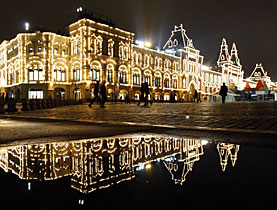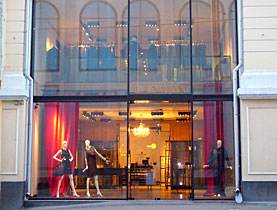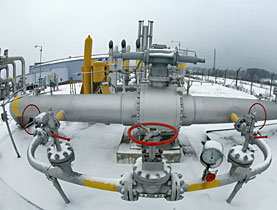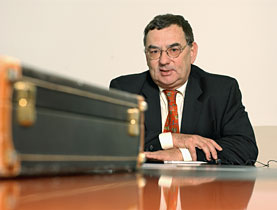Swiss and Russians seen in a win-win situation

Russia is a land of opportunity but also a land of contradictions, where many businesses hesitate to invest.
Representatives of Swiss small and medium-sized enterprises recently visited Russia to discover the situation for themselves.
Jean-Daniel Gerber, director of Switzerland’s State Secretariat for Economic Affairs (Seco), who was heading an official mission to Moscow at the same time, explained to swissinfo.ch Switzerland’s advantages in doing business with Russia.
“When you are making highly sophisticated products, then you adapt quickly to the market,” he explained, pointing out that it is much easier to do this with quality goods than with mass products.
As an example he cited machine-tools: less showy than watches (which do similarly well in Russia), they are also a major Swiss export branch, and always have to be designed to fit the clients’ specific needs.
Problems
As a developing economy, Russia poses risks quite unfamiliar to western businesses, according to Philippe Gaillard, a consultant based in Fribourg who specialises in risk management for Russia and eastern Europe.
“There are a lot of regulations which are sometimes contradictory; the authorities who take decisions often lack the necessary perspective, which means it can be a headache for companies to obey the law.”
Omya, a Swiss multinational dealing in industrial minerals, has come up against another side of this legal jungle. Rainer Siedler, its manager for Russia, told swissinfo.ch of its problems in securing the vital marble deposits it needs for its production. Twenty years ago privatisation was rushed through, leaving a tangle of claims.
“It can happen that you are legally challenged to defend your property rights. Obviously as an international company we can only use legal means, whereas sometimes the Russian raiders, if you like, use all kinds of means.”
But not everything is gloomy, as Gaillard points out. Corruption is widespread, he admits, but there is an open debate about it. As for the so-called mafia, the subject is somewhat taboo. But in any case such people tend not to target foreign companies, whose way of operating makes it difficult to snatch the quick profit they aim for.
Companies which are not in direct competition with local Russian ones face fewer problems too. “The Swiss are generally well-placed, because on the whole they produce hi-tech products,” he explained.
Problem solving
The Russians are of course not oblivious to the difficulties. Sergey Borisov, president of Opora Russia, which represents medium and small businesses, explained to the delegation how his organisation is fighting to get red tape removed, and how it is promoting cooperation with foreign enterprises.
Russia has highly educated scientific experts, he told swissinfo.ch, “but we don’t have much experience in marketing. That’s why I would like to see our future cooperation in both directions.”
One area which has seen the opportunities afforded by foreign investment is Kaluga, just south of Moscow, where the different branches of the local authority are working together to make the region investor-friendly: ensuring favourable legislation, and setting up business parks with all the necessary infrastructure.
Swiss-based international Nestlé has taken advantage of this open policy to set up a pet food plant in one of these parks. This factory now has nearly 15 per cent of the Russian market share.
Why Russia?
Why is doing business together so important? Russia is huge and developing fast; for Gerber, “as soon as the economic crisis has bottomed out”, it will be a major market for Switzerland.
The Swiss businessmen had mainly come to Russia to look for partners to help in the distribution of their products.
Francis Liebens of Solo Swiss, whose business is furnaces, summed up the major problems as bureaucracy and customs formalities. “In my opinion the only way to overcome them is to find a Russian partner who could help us to develop in this market,” he told swissinfo.ch
Vadim Osipov, who heads the family laminate business Slotex in St Petersburg, and who switches easily between Russian, German and English, gave swissinfo.ch a Russian perspective.
“I think you only get breakthrough innovations when you get people working together who are the best in the world, each in their own area.”
Small Swiss companies could very well cooperate with Slotex. “They specialise in the latest scientific developments, and in getting them to market. That’s something we are interested in,” he said.
The government of Kaluga has already seen that foreign investment creates jobs and brings in tax revenue. But governor Anatoly Artamanov has a wider vision. He told the delegation that in today’s “dangerous world” the best defence is the interpenetration of capital, so that each defends the other’s interests.
Switzerland’s ambassador in Moscow, Walter Gyger, had no doubt why the businessmen should be there.
“You must be in Russia now, to be able to use the chances that will come in the future,” he told them.
Julia Slater, in Moscow, swissinfo.ch
In 2008 Swiss exports to Russia were worth SFr3.18 billion ($2.92)
Imports from Russia were worth SFr1.05 billion.
Switzerland’s main exports to Russia are:
Pharmaceuticals
Machinery
Watches
Agricultural Produce
Metals
Russia’s main exports to Switzerland are:
Precious metals
Chemical products
Energy sources
Non-precious metals
Machinery
Russian President Dmitri Medvedev is scheduled to visit Switzerland in September.
Swiss and Russian ministers meet frequently. Here is a selected list since the beginning of 2007.
Economics Minister Doris Leuthard met her Russian counterpart, German Gref, in Davos in 2007, and Deputy Prime Minister Aleksandr Zhukov in Zurich in 2008. She led a delegation to Moscow, Yekaterinburg and St Petersburg later that year.
Foreign Minister Micheline Calmy-Rey met her Russian counterpart, Sergey Lavrov, in Moscow in 2007 and paid a courtesy visit to then President (now Prime Minister) Vladimir Putin. She met Lavrov again twice in 2008.
The then Sports Minister Samuel Schmid met First Deputy Prime Minister Sergey Ivanov and Sports Minister Vyacheslav Fetisov in 2007.
Interior Minister Pascal Couchepin, in his capacity as Swiss president, met Medvedev in 2008.
Justice Minister Eveline Widmer-Schlumpf met her Russian counterpart, Alexandr Konovalov in 2009.

In compliance with the JTI standards
More: SWI swissinfo.ch certified by the Journalism Trust Initiative



You can find an overview of ongoing debates with our journalists here. Please join us!
If you want to start a conversation about a topic raised in this article or want to report factual errors, email us at english@swissinfo.ch.